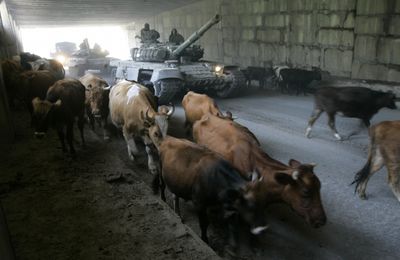Blasts mar Georgians’ return

SKRA, Georgia – A large explosion Sunday morning destroyed a train carrying oil through this town in central Georgia, engulfing mangled cars in a tower of flames. Georgian officials said they suspected Russian forces had mined the track or an adjacent military base.
Earlier in the day, separate blasts in the area killed a woman near a military installation and critically injured a man.
The explosions came as Georgians returned en masse for the first time to parts of the country briefly occupied and then abandoned Friday by Russian forces. During fighting this month, Russian forces used cluster munitions, many of which remain unexploded, and blew up several military facilities and a key railroad bridge.
“I am sure the Russians have left other surprises for us,” said Shota Utiashvili, a spokesman for Georgia’s Interior Ministry. “They want to disrupt our life and our economy as much as possible.”
All day Sunday, Georgians poured into Gori, the largest city the Russians held during the conflict, which ignited when Georgian forces attacked the breakaway Georgian territory of South Ossetia on Aug. 7. Russian forces then drove them from the disputed region and seized up to a third of Georgia. Russia withdrew from some of that territory Friday, but Georgian and international officials say Russian forces remain in violation of a French-brokered cease-fire that called for withdrawal from all Georgian land.
Gori’s Stalin Square, named for the former Soviet dictator who is the city’s most famous son, became a large bus depot Sunday. Yellow coaches bearing residents arrived on a highway congested with returnees who had fled to outlying areas to escape the fighting. They loaded large packages full of belongings into taxis and returned home, some for the first time in two weeks. A young girl stepped off a bus tightly clutching a stuffed tiger about her size.
“It’s been quiet where I was for the past two weeks, but now I am worried, even though I am happy to be back,” said Marine Tabuashvili, 47, who returned with two children Sunday from her refuge in the village of Telavi. Her husband, who stayed behind in Gori during the occupation, had already told her their home had been robbed, she said.
“I am afraid that what happened here with the Russians will happen again,” she said.
Aid workers provided Gori residents with blankets and boxes of high-energy biscuits. A U.S. naval destroyer delivered relief supplies Sunday at the Black Sea port of Batumi, the first of three such American vessels due to arrive in the coming days. The western port of Poti – far from the combat zone – is still occupied by the Russian army.
“The situation in the Black Sea is tending to become more tense,” Col. Gen. Anatoly Nogovitsyn, deputy head of the Russian general staff, told reporters Sunday as the U.S. ship steamed toward port. “NATO countries are building up their naval presence to deliver humanitarian aid. … I do not think that this will contribute to the stabilization of the situation in the region.”
Georgian military forces continued to return to bases in Gori and elsewhere Sunday, bringing them within a few miles of Russian soldiers manning checkpoints north of the city.
At Gori’s military hospital, Shalva Goderdzishvili, a trauma surgeon who operated on Sunday’s blast victims, said authorities were distributing a booklet bearing photographs of explosive devices to avoid. De-mining workers said that Gori was relatively safe, but that surrounding areas could still be dangerous.